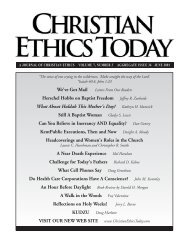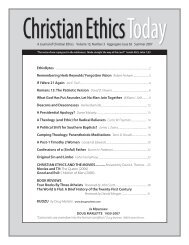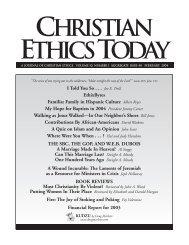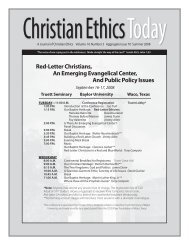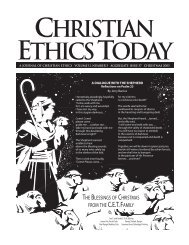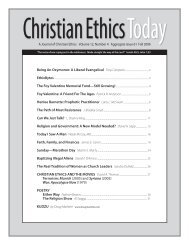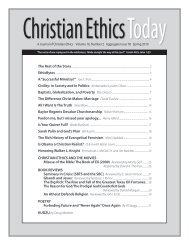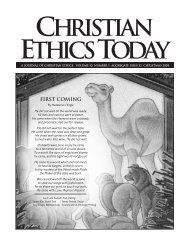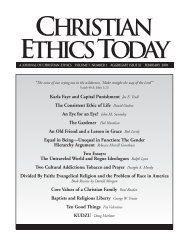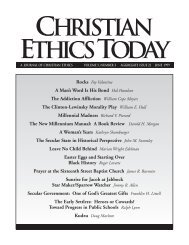Issue 033 PDF Version - Christian Ethics Today
Issue 033 PDF Version - Christian Ethics Today
Issue 033 PDF Version - Christian Ethics Today
Create successful ePaper yourself
Turn your PDF publications into a flip-book with our unique Google optimized e-Paper software.
September of 1963 when, en route to Jackson, my Greyhound<br />
bus made its first stop in the Magnolia State. There at the bus<br />
station were separate bathrooms, water fountains, and lunch<br />
counters designated for “Whites” and for “Coloreds.” I<br />
remember being vaguely uncomfortable drinking from the<br />
“White Only” water fountain. I had a gnawing feeling in the<br />
pit of my stomach that I couldn’t really articulate. I was entering<br />
Mississippi College, then an all-white bastion of Baptists,<br />
many of whom didn’t seem to notice that we were living<br />
through the days of “Mississippi Burning.” It had been just a<br />
year since President Kennedy had sent 10,000 National<br />
Guardsmen to Oxford to protect one black man, James<br />
Meredith, who wished to register for classes at the University<br />
of Mississippi. By the fall of 1963, the local newspapers often<br />
headlined stories of church burnings, freedom riders, and<br />
racial violence. Ross Barnette and George Wallace, the governors<br />
of Mississippi and Alabama, were heroes of many white<br />
Mississippians, who supported their segregationist policies.<br />
Two experiences during my freshman year of college<br />
shaped my views concerning racial distinctions for the rest of<br />
my life. First, I spent the weekend at the home of a friend in<br />
Meridian, Mississippi. On Sunday morning, as we sat in the<br />
sanctuary of the First Baptist Church, he pointed to two men<br />
seated near us in the all white congregation. “See those men<br />
over there?” he gestured. “They’re two of the men who’ve been<br />
indicted for the murder of those freedom riders from<br />
Philadelphia. They’re out of jail now, awaiting their trial.”<br />
“Why are they here?” I stammered. “They attend this church<br />
regularly!” I was dumbfounded that active church members<br />
might commit murder. Since that weekend in 1963, I’ve<br />
learned the embarrassing truth that <strong>Christian</strong> history is stained<br />
by brutal crimes of intolerance perpetrated in the name of religious<br />
or racial purity. But I was naïve then and so that shocking<br />
moment, as I watched two accused murderers calmly<br />
singing <strong>Christian</strong> hymns with their children, etched itself<br />
unforgettably in my mind.<br />
The other event occurred one evening as four college<br />
friends and I arrived at the campus of Tougaloo College, a<br />
black educational island in the midst of a vast sea of cultural<br />
whiteness. We slipped into the back row of the auditorium to<br />
hear the concert of Joan Baez, the famous folk singer so identified<br />
with the Civil Rights movement. We were, as far as I could<br />
see, the only whites in the crowded auditorium. The concert<br />
was wonderful, but the most stirring song of all was her trademark<br />
closing. As she broke into the opening lines of the<br />
Freedom Hymn, the beautiful “We Shall Overcome,” everyone<br />
in the audience stood and began singing with her. We five were<br />
linked to all the rest, arms intertwined, raising our voices to<br />
sing as one mighty choir: “We’ll walk hand in hand, we’ll walk<br />
hand in hand, we’ll walk hand in hand some day. O deep in<br />
my heart, we do believe, that we’ll walk hand in hand some<br />
day.” The emotion of the moment was overpowering. A feeling<br />
of profound rightness burned itself indelibly onto my heart.<br />
We were not frightened being the only whites in a huge crowd<br />
of blacks, for at that moment we were all one in spirit. Our<br />
concern, to be perfectly honest, was that after we left Tougaloo<br />
24 • APRIL 2001 • CHRISTIAN ETHICS TODAY<br />
and began crossing the dark countryside toward our own campus,<br />
our little company of idealists might be pulled over by<br />
some carload of angry Anglos. But if we were tense, we were<br />
also hopeful—speeding through the night on eagle’s wings of<br />
optimism and passion.<br />
Any anticipation we had, however, that the sort of powerful<br />
message about love and mutual acceptance expressed that<br />
night could eventually end racial strife was certainly unfounded.<br />
America today remains a nation where racial, religious, and<br />
social discriminations are common. Globally, there is international<br />
terrorism, sectarian conflict, ethnic cleansing, tribal<br />
wars, gay bashing, spousal, child, or elderly abuse, and much<br />
more. In the 37 years since I entered college, how far has our<br />
society progressed? Sadly, there are still people in America who<br />
are excluded, ridiculed, manipulated, oppressed, battered,<br />
falsely jailed, and even murdered because of their racial, religious,<br />
gender, social, or sexual differences. The 1998 dragging<br />
death of James Byrd in Jasper, Texas, is a horrific reminder,<br />
much too close to home, of what some people still do to one<br />
another!<br />
Welcoming Multiculturalism<br />
And so I raise the question some of you are probably asking<br />
yourselves: why, on our campus—where we have<br />
very little diversity anyway and no ethnic, religious, or social<br />
violence—why HERE do we need a program on multiculturalism?<br />
Why must WE embrace others who are unlike ourselves?<br />
Why must Hardin-Simmons initiate conversations<br />
about such distinctions? I’d like to suggest five reasons.<br />
First, because it is appropriate. This is the personal answer.<br />
Racial, religious, or social discrimination is our problem.<br />
Perhaps our awareness has been dulled by our insulation on<br />
this predominantly white and <strong>Christian</strong> campus. Therefore<br />
when we hear about the clash of cultures, we assume the conflicts<br />
will always be out there. We mistakenly think these are<br />
African American, Native American, Asian American, and<br />
Hispanic American problems, or that they are Jewish, Muslim,<br />
Hindu, and Buddhist problems. But intolerance and injustice<br />
are our problems. We have to think about multiculturalism<br />
and the acceptance of others because discrimination is a problem<br />
we suffer personally. One might argue that there is no one,<br />
regardless of racial or religious identity, that has never felt<br />
intolerant or held some untested, unfair opinion about others.<br />
While this may be true, WE are not excused from our prejudicial<br />
thinking simply because everyone is similarly tempted.<br />
Nor, in our defense, may we claim that prejudicial ideas<br />
have been instilled within us from childhood. It is true that we<br />
aren’t born with these views. Our unfair attitudes and stereotypical<br />
thought patterns have been passed on to us. To quote<br />
from Rodgers and Hammerstein’s musical South Pacific:<br />
You’ve got to be taught to hate and fear. You’ve got to be<br />
taught from year to year. It’s got to be drummed in your dear<br />
little ear. You’ve got to be carefully taught. You’ve got to be<br />
taught to be afraid Of people whose eyes are oddly made, And



